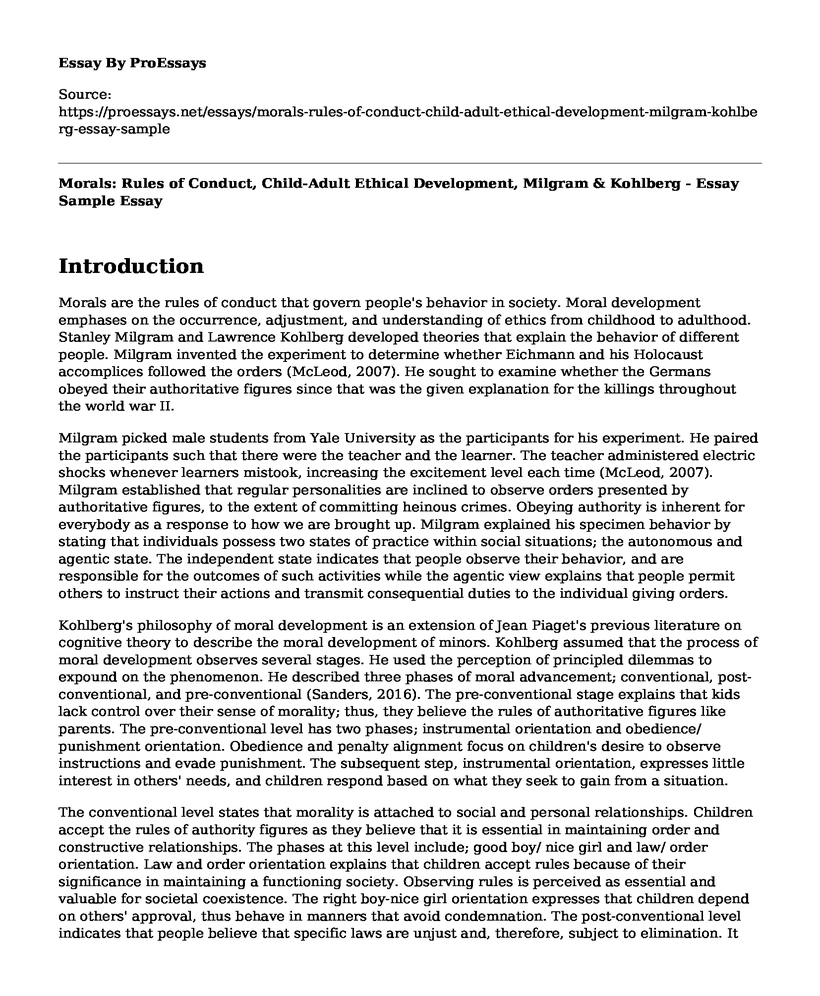Introduction
Morals are the rules of conduct that govern people's behavior in society. Moral development emphases on the occurrence, adjustment, and understanding of ethics from childhood to adulthood. Stanley Milgram and Lawrence Kohlberg developed theories that explain the behavior of different people. Milgram invented the experiment to determine whether Eichmann and his Holocaust accomplices followed the orders (McLeod, 2007). He sought to examine whether the Germans obeyed their authoritative figures since that was the given explanation for the killings throughout the world war II.
Milgram picked male students from Yale University as the participants for his experiment. He paired the participants such that there were the teacher and the learner. The teacher administered electric shocks whenever learners mistook, increasing the excitement level each time (McLeod, 2007). Milgram established that regular personalities are inclined to observe orders presented by authoritative figures, to the extent of committing heinous crimes. Obeying authority is inherent for everybody as a response to how we are brought up. Milgram explained his specimen behavior by stating that individuals possess two states of practice within social situations; the autonomous and agentic state. The independent state indicates that people observe their behavior, and are responsible for the outcomes of such activities while the agentic view explains that people permit others to instruct their actions and transmit consequential duties to the individual giving orders.
Kohlberg's philosophy of moral development is an extension of Jean Piaget's previous literature on cognitive theory to describe the moral development of minors. Kohlberg assumed that the process of moral development observes several stages. He used the perception of principled dilemmas to expound on the phenomenon. He described three phases of moral advancement; conventional, post-conventional, and pre-conventional (Sanders, 2016). The pre-conventional stage explains that kids lack control over their sense of morality; thus, they believe the rules of authoritative figures like parents. The pre-conventional level has two phases; instrumental orientation and obedience/ punishment orientation. Obedience and penalty alignment focus on children's desire to observe instructions and evade punishment. The subsequent step, instrumental orientation, expresses little interest in others' needs, and children respond based on what they seek to gain from a situation.
The conventional level states that morality is attached to social and personal relationships. Children accept the rules of authority figures as they believe that it is essential in maintaining order and constructive relationships. The phases at this level include; good boy/ nice girl and law/ order orientation. Law and order orientation explains that children accept rules because of their significance in maintaining a functioning society. Observing rules is perceived as essential and valuable for societal coexistence. The right boy-nice girl orientation expresses that children depend on others' approval, thus behave in manners that avoid condemnation. The post-conventional level indicates that people believe that specific laws are unjust and, therefore, subject to elimination. It marks the realization that people are distinct units from society, who disobey instructions inconsistent with their values (Sanders, 2016). The stages associated with this level include; universal-ethical-orientation and social-contract-orientation. The initial stage portrays acceptable principles as abstracted, thus promoting justice and validity, while the latter represents laws as entities that promote the general welfare for people.
Milgram's experiment occurred in a laboratory; thus, the same conditions may lack application in real-life circumstances. In reality, we obey non-subtle rules than those that require an electric shock. The experiment was more suitable for a military setting. Milgram was also gender-biased since he experimented on the male and not female; thus, the results cannot be concluded for both gender since we are not aware of what the female gender findings may be. On the other hand, Kohlberg's s theory uses a generalization of reasoning in both women. In conclusion, Stanley Milgram's experiment on obedience and Lawrence Kohlberg's phases of moral expansion explain only a portion of the moral development of people in society but has not covered the whole population.
References
McLeod, S. A. (2007). The Milgram experiment. Simply Psychology.
Sanders, C. (2016). Lawrence Kohlberg's stages of moral development. Journal of Abnormal and Social Psychology.
Cite this page
Morals: Rules of Conduct, Child-Adult Ethical Development, Milgram & Kohlberg - Essay Sample. (2023, Mar 09). Retrieved from https://proessays.net/essays/morals-rules-of-conduct-child-adult-ethical-development-milgram-kohlberg-essay-sample
If you are the original author of this essay and no longer wish to have it published on the ProEssays website, please click below to request its removal:
- Ethnical Choices in Computer Games
- Why Is It Important for Instructors and Leaders to Be Ethically Sound - Essay Sample
- Protection of Perfect Human Research and Principles Essay
- Corporate Social Responsibility (CSR) and Business Ethics Essay
- Essay Example on Personal Values, Relation & Professional Ethics: Impact on Social Work
- Essay on Ethical Relativism as an Explanation of Human Morality
- Expository Essay on God and Ethical Beliefs Utilitarian and Kantian Ethics







